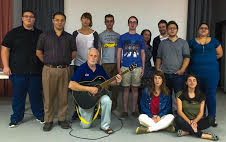November 2015 - News!
Conferences, Symposiums, Workshops view all upcoming
-
14th biennial International Conference on Music Perception and Cognition (IMPC14) will be held in San Francisco July 5-9, 2016. Period for abstract submission is now open. LINK
AIRS News
-
Godfrey Baldacchino, University of Malta, sent this photo of a fine start to the Degree Plus Choir/Song Circle experience for the 2015-16 academic year. Students from Denmark, Sweden, Belgium, USA, Italy and Malta, along with the animate guitarist Frank O'Neill, enjoyed the first of hopefully many more hours of singing fun with the Multicultural Song Circle of the University of Malta.

-
The ice-breaker effect: singing mediates fast social bonding, Eiluned Pearce, Jacques Launay, Robin I. M. Dunbar, Royal Society Open Science, 2, 150221. LINK
Abstract
It has been proposed that singing evolved to facilitate social cohesion. However, it remains unclear whether bonding arises out of properties intrinsic to singing or whether any social engagement can have a similar effect. Furthermore, previous research has used one-off singing sessions without exploring the emergence of social bonding over time. In this semi-naturalistic study, we followed newly formed singing and non-singing (crafts or creative writing) adult education classes over seven months. Participants rated their closeness to their group and their affect, and were given a proxy measure of endorphin release, before and after their class, at three timepoints (months 1, 3 and 7). We show that although singers and non-singers felt equally connected by timepoint 3, singers experienced much faster bonding: singers demonstrated a significantly greater increase in closeness at timepoint 1, but the more gradual increase shown by non-singers caught up over time. This represents the first evidence for an ‘ice-breaker effect’ of singing in promoting fast cohesion between unfamiliar individuals, which bypasses the need for personal knowledge of group members gained through prolonged interaction. We argue that singing may have evolved to quickly bond large human groups of relative strangers, potentially through encouraging willingness to coordinate by enhancing positive affect.
- Log in to post comments

